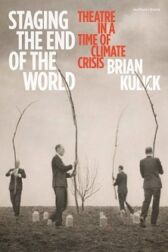Synopsis
Staging the End of the World - Theatre in a Time of Climate Crisis
 $23.99
$23.99
Published by Methuen Drama
This book is a brief history of the end of the world as seen through the eyes of theatre
Since its inception, theatre has staged the fall of empires, floods, doomsdays, shipwrecks, earthquakes, plagues, environmental degradations, warfare, nuclear annihilation, and the catastrophic effects of climate change
Using a wide range of plays alongside contemporary thinkers, this study helps guide and galvanize the reader in grappling with the climate crisis
Kulick divides this litany of theatrical cataclysms into four distinct historical phases
- the Ancients, including Euripides and Bhasa, the legendary Sanskrit dramatist
- the Age of Belief, with the anonymous authors of the medieval mystery cycles, Shakespeare, and Pushkin
- the Moderns, with Ibsen, Chekhov, Brecht, Beckett, and Bond
and, finally, the way the world might end now, encompassing Caryl Churchill, Tony Kushner, and Anne Washburn
In tandem with the insights gleaned from these playwrights, the book draws upon the work of contemporary scientists, ecologists, and ethicists to further tease out the philosophical implications of such plays and their relevance to our own troubled times
In the end, Kulick shows how each of these ages and their respective authors have something essential to say, not only about humanity's potential end, but, more importantly, about the possibility for our collective continuance
Table of Contents
Introduction: On Transforming Our Social Imaginary
PART ONE: THIS IS THE WAY THE WORLD ENDS IN ANCIENT TIMES
1. Lessons Amongst the Ruins; Or, What Survives and Why: How the Cultural Detritus of the Ancients Can Become a Kind of First Philosophy
2. Slouching Toward Kurukshetra: A Brief Look at the Mahabharatas of Bhasa, Bharati, and Brook
3. Diasporas Old and New: What Euripides' Children of Herakles Can Tell Us About the Coming Climate Wars and Resulting Refugee Crisis
PART TWO: THIS IS THE WAY THE WORLD ENDS IN THE AGE OF FAITH
4. Noahs, Arks, and Floods: Why Medieval Mystery Plays Still Have Something to Say About Our Modern Day “End of Days”
5. Shipwrecks, Recursion, and the Necessity of Deep Ecology: Surviving Shakespeare's The Tempest and the Breaking of Our Anthropocene Ways
6. On Earthquakes and Metaphors: Bouilly's Disaster of Lisbon and the Fukushima Variation
PART THREE: THIS IS THE WAY THE WORLD ENDS IN MODERN TIMES
7. Plague's Threat to Our Immune and Belief Systems: A Look at Pushkin's A Feast in the Time of Plague
8. A Canary in the Bourgeois Coal Mine, Part One: Pollution and Direct Critique in Ibsen's An Enemy of the People
9. A Canary in the Bourgeois Coal Mine, Part Two: Denial and Indirect Critique in Chekhov's The Cherry Orchard
PART FOUR: THIS IS THE WAY THE WORLD ENDS NOW
10. Ethics During Dark Times: Brecht's He Who Says Yes and He Who Says No
11. On the Other Side of the Apocalypse: The Broken Worlds of Beckett and Bond
12. Nostalgia for the Future: The Fraught Tomorrows of Rivera, Churchill, Washburn, and Kushner
Coda: And in the End